We leave Gabon without having seen any elephant, and with the hope of finding more food in Congo. The Gabonese immigration post is in Boumango, 17 kilometers before the real border. The employee is here but we have to wait for the boss to show up, since only the big boss can stamp passports. We have time to watch TV like in a waiting room …
The road to Congo is a narrow and quiet dirt one. The sand surface is quite hard and it goes not too bad. In one of the bumps, where I am used to brake, I manage to break one of the four screws holding the circular plastic rail of the bottom hook of my Vaude pannier. It can’t be repaired as it is plastic, but it is not terrible news, as the three other screws are still there. I guess this kind of thing should happen; it is already a good achievement for the plastic part of the gear to have survived 20’000 km of rough roads. I just change the orientation of the bottom hook to put the efforts on another part of the plastic rail.
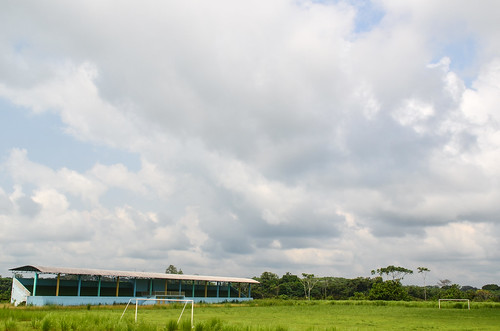

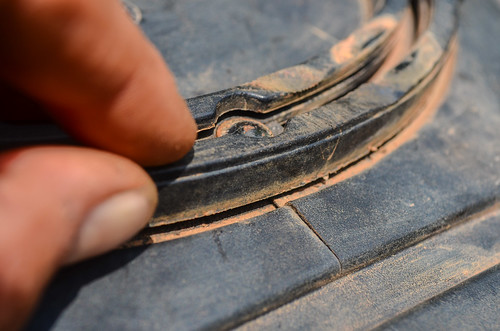

An agitated river marks the natural border. The small bamboo stalls here let me guess that it is also where the weekly market happens, where people come and buy goods from the other country.
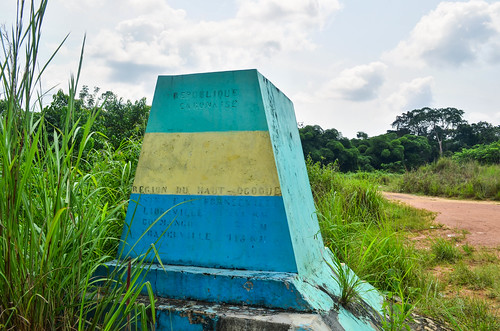

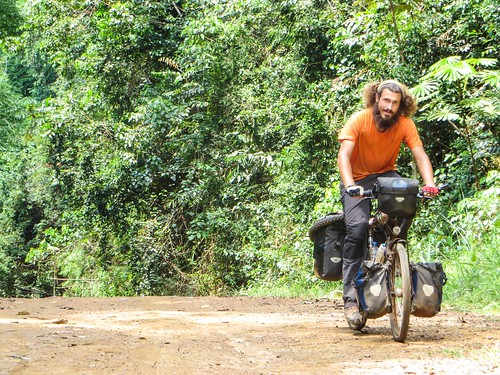
Soon after, we stop at the Congolese immigration post of Simonbondo. It is a single room wooden hut next to a rusty barrier, and the officer comes from his home with the register. I have to instruct him to stamp my passport where I want, and he agrees. So far so good, another border crossed and two stamps on already used pages: I saved my precious last empty double-page for the Angolan visa application!

However, because of the restricted space I gave to the officer, the stamp only shows 02.01.20: I miss the “14” of 2014. So as to avoid problems at the exit of Congo, I get to stamp my own passport to add the missing “14”.
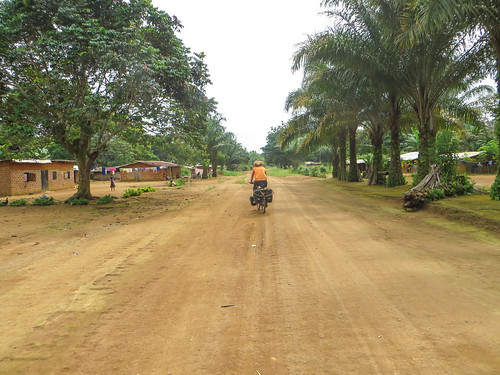
The people of this region are Téké, like in Gabon. They speak the same language, called Mounkoutouba. We also learn that there are,not surprisingly, too many ethnic groups in Congo, with 6 different ones on the road until Sibiti, a mere 200 km away.
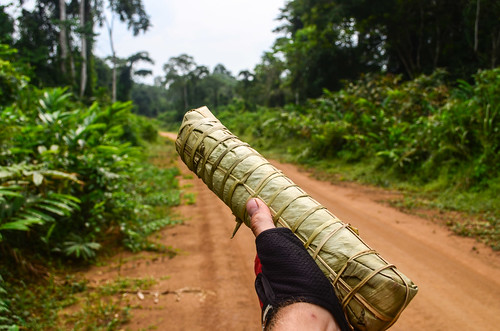
The main road is, here again, decorated with elephant footsteps. We try to follow them but don’t meet any animal, except for a big snake crossing just in front of us.

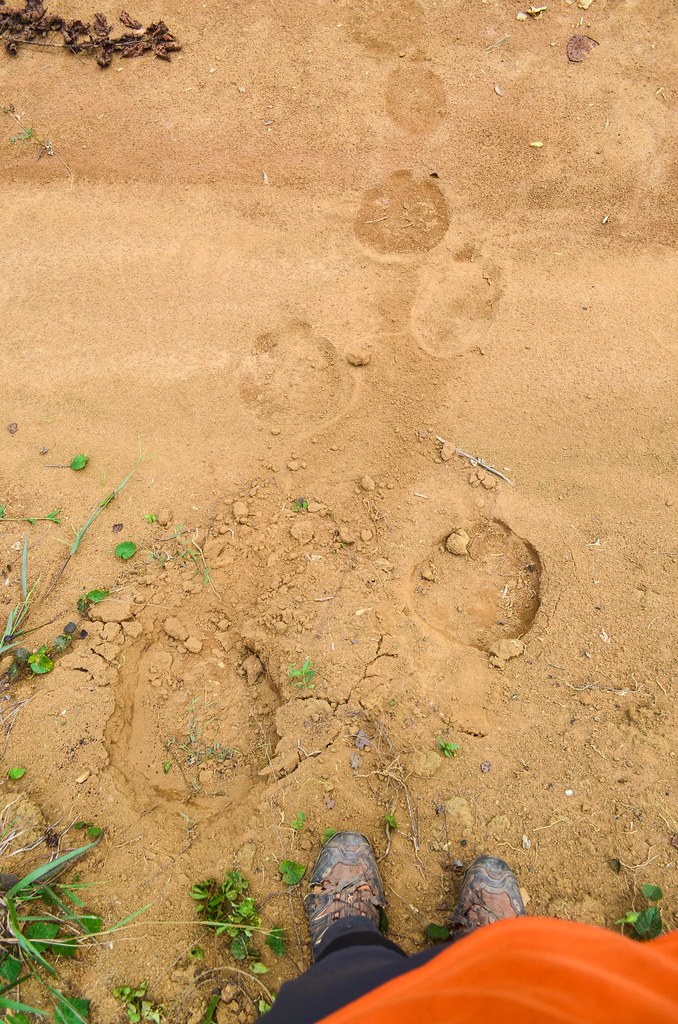
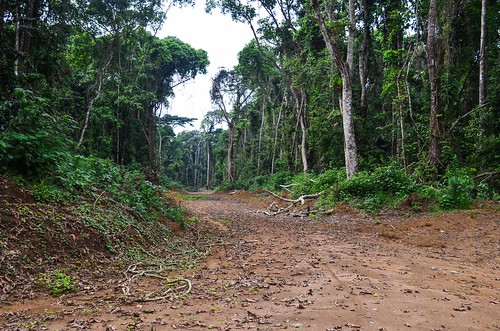
As there are elephants around, I expect that people can’t grow bananas and kassava. Elephants were the reason why the Gabonese have no locally grown food, as we were explained too often. But to my surprise, Congolese villagers say they are not annoyed by the animals. Either Congolese elephants are more respectful than Gabonese elephants, or, in case the elephants are the same, they realize when they cross the border and they only eat Gabonese bananas…
Well, anyway, coming from Gabon, Congo feels back into “Africa” again, for the social experience: people are curious, and when we stop for a short minute to talk to someone, a large silent crowd of watchers, young and older people, watches us. Kids sometimes run after us, like they do everywhere in rural areas, except in Gabon.
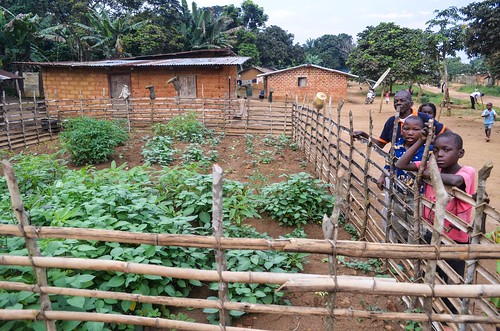
Sadly, the food situation doesn’t improve; it isn’t different from Gabon: small shops only sell cans. And not even cans of meals ready-to-eat like cassoulet, peas, lentils, etc, but cans of sauces, cans of milk, and cans of sardines. We have to ask villagers where we can find the stick of kassava, which seems to be the only food made locally. Regarding dishes ready to eat, no one is preparing anything. They say we have to wait for the “restaurants” in the cities. It’s very disappointing. While cycling in West Africa, I thought Central African countries – the less populated and oil-rich Gabon, Congo and Angola – would have better roads, better internet … better everything. But it seems to be the complete other way around. And the beer in the bush goes up to 1000 CFA.
There is wood logging ongoing in the forest. We are told Malaysians and Indonesians are the local forestiers. There is no electricity and we are told we would have to wait to reach Sibiti for electricity working a few hours a day, or Dolisie for electricity that works throughout the day. Dolisie, that is already Congo’s third city …
When I ask “On dit quoi?“, I am replied “Rien“. It means the Gabonese way to ask “how are you” doesn’t work anymore. “– Ca va? – Ca va” was there replaced by “– On dit quoi? – On est là“. “On est là” means “I’m fine”, even for one person. Another way to ask “Ca va?”, used in Cameroon is “C’est comment?”
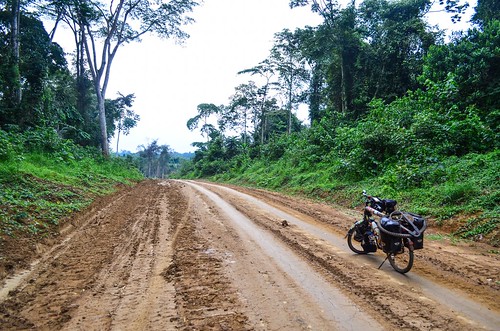
Another French variant is “Vous revenez d’où“, sometimes “Vous revenez où?“, or “Vous avez quitté où?” for “Where do you come from?” The Gabonese had warned us that the Congolese were a population of savages. As it happens systematically, the population of one country would despise the neighboring country on the southern border. Of course the Congolese are not savages, but it is true that they are less polite than the Gabonese. In the bush, they don’t say “Bonjour” if we don’t say it first, and sometimes they don’t even reply. Well, here, I’d say the Gabonese are the African exception.
We reach Bambama, our target for the day. The largest of the small shops is run by a Mauritanian, as usual, but in front of him, we find beignets! While dough balls are sold on every road and every street corner of West Africa, whether there is rain, power shortages, or whatever, it feels here that we just found a gold nugget. There are a lot of policemen around, and big crowds as well. This is because there was “mort d’homme”: we are explained that Pygmies killed a man and escaped Bambama. That’s why we saw heavy police convoys during the day.
After checking in our hotel, at the other end of the town, we venture out in Bambama to hunt for food … and we find nothing. Sardine cans and dry cookies hardly ever make a good dinner, so we keep looking. The Mauritanian shopkeeper knows a lady making patachoux, a different kind of beignet, and he calls her on our request so that we can buy something fresh. We also look for the house of the lady that used to sell bâtons de manioc, and luckily she has two of those kassava sticks left. It costs 250 CFA for a stick, while it was around 100 CFA for 4 in Cameroon, but it is not comparable in size: they are massive here. It makes too much of tasteless pounded kassava, but that is our only option to avoid eating cans again.
After the very loud thunder and heavy rain of the night, I fear the dirt roads will give us a hard time. But we must first register at the immigration and police offices of Bambama. They didn’t stop us yesterday because they were too busy dealing with the murder case.
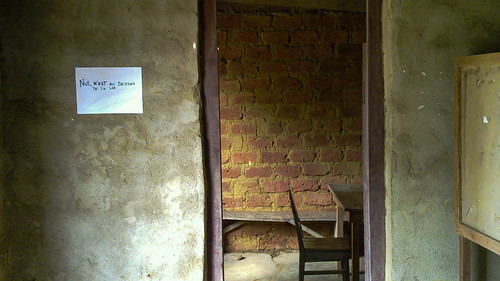
Someone tells us the full story of what happened. In fact, it’s not just a simple New Year party drunk fight. It started like this: a stranger, Mister Stranger, from some other region of Congo, visited the Bambama village to buy bush meat. There, he met Mister Local, an old friend, and happy to meet again, they drank a lot. Nothing uncommon until here. At around 2 am, Mister Local walked Mister Stranger to where he stayed. The next day, Mister Stranger couldn’t be found. The villagers said that Mister Local, being the last one to have seen him, must know. But Mister Local replied he didn’t know anything. Then, the village called the hometown of Mister Stranger to check, and he had not returned. So, the villagers logically came to the conclusion that Mister Local must have killed Mister Stranger! And the police took Mister Local to jail.
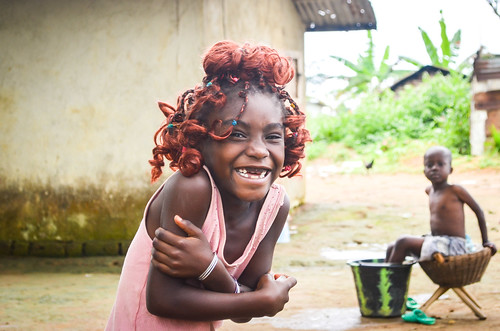
It would be fine if the story ended here. The problem is that Mister Local is a Bantu, the locally predominant ethnic group (it must be the Tékés here), while Mister Stranger, regardless of the reasons of his disappearance, was a Pygmy, the marginalized minority. Naturally, the Pygmy population of Bambama doesn’t trust the police, and they think the Bantus are protecting each other anyway. They thought the police would not do anything to the murderer because they are from the same ethnic group, and they decided, for once, to take the law into their own hands. They pulled out Mister Local from his cell (which was apparently not too hard, as the three policemen didn’t resist in front of the excited crowd) and beat him to death. Proper justice was made. It would be fine, maybe according to traditions, if the story ended here.
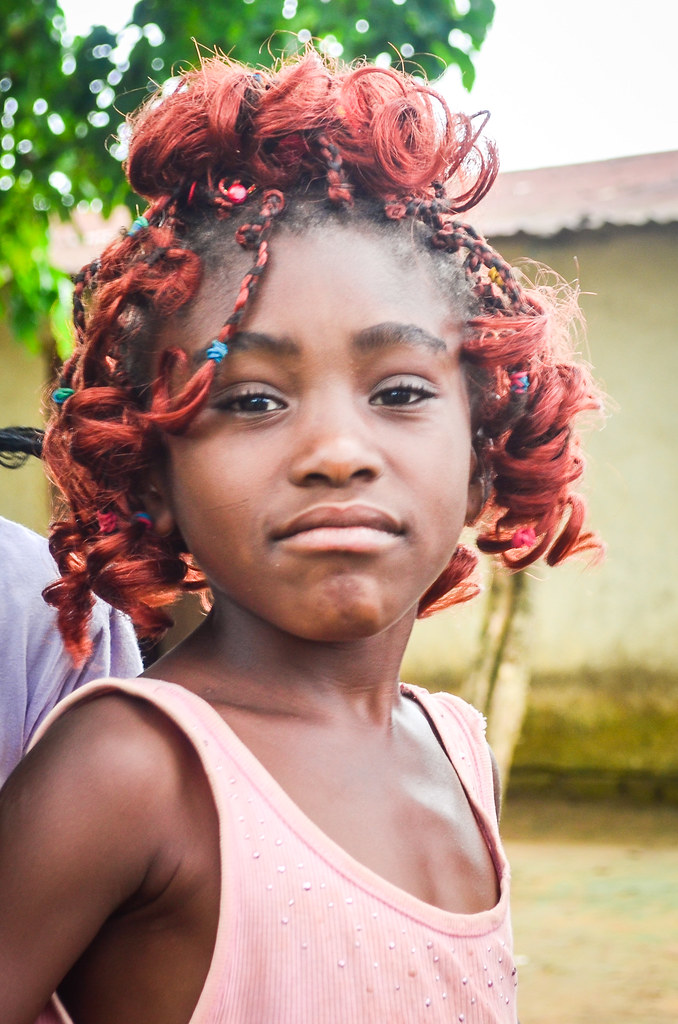
However, the next day, Mister Stranger unexpectedly showed up. On the evening of the “crime”, he was drunk, lost his way home, and has probably slept in the forest. He is a Pygmy after all. Even if Pygmies, like everyone else, wear football shirts of Real Madrid or Chelsea and have loads of MP3s on their fake smartphone, some of them must still have good survival skills in the forest. Mister Stranger showed up 3 km from the village, not too many hours after his disappearance, but late enough to have missed the real crime.
Now, the fact is that the Pygmy people of the village have lynched a man based on a false accusation. Extra police forces from Sibiti come up to Bambama, and even further, to arrest them. But they already fled towards the Gabonese border on jakartas, the name for the cheap and small bike-scooter. We may have seen some of them on our way yesterday…
Despite the fact that I keep complaining about the poor food in Gabon and Congo, there is one domain in which these Central African countries outrank the West African nations: hairstyles.

There are here much more creative. In West Africa, most girls were shaved, just like the boys, and sometimes the earrings really helped making the difference. Here however, even for the youngest, a lot of care is spent in the hair. So many little girls have multi-coloured pearls, heavy braids, curly extensions …

The road is made of hardened sand, therefore the heavy rain made it slippery. Some parts are flooded. Even if sand is better than sticky mud, I am looking forward to the laterite that is supposed to start in some 30 kilometers.
We stop in a large village for lunch, and as usual, there is no food but sardine cans. Not even bread. It is imported on Saturdays from Sibiti, which lies 200 km away!
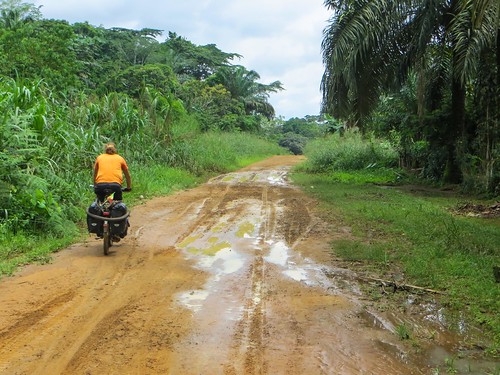
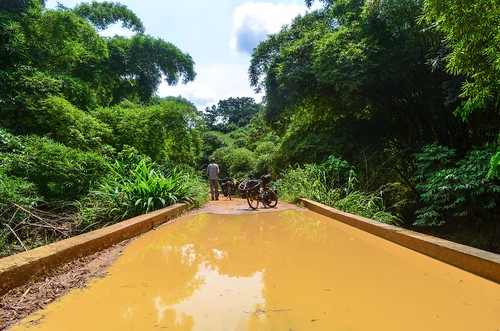
“Why there isn’t anything local available?“, I ask to the shopkeeper. Locals must grow and eat things, and I’d rather eat that same thing instead of imported cans. He answers that here, people don’t need to cook and sell food to make a living. There is always a family member working for the Malaysians (timber), or for MPD (mining). As a result, locals in the village don’t need to have an additional activity. By the way, the road improves from here onwards thanks to MPD (Glencore Xstrata is behind it), who laid laterite. There is nothing to expect from the government anyway. He adds that the potential crops also face the problem of transport: roads are too bad to transport raw food until the town and sell it. So, having kilos of bananas in the village don’t help: villagers grow no more than what they eat. It is a valid reason, but I have seen roads much worse elsewhere and there was still a lot of local production.

In the end, we eat once again the tasteless kassava stick with the best taste-maker we have found, a pot of mayonnaise made in France.
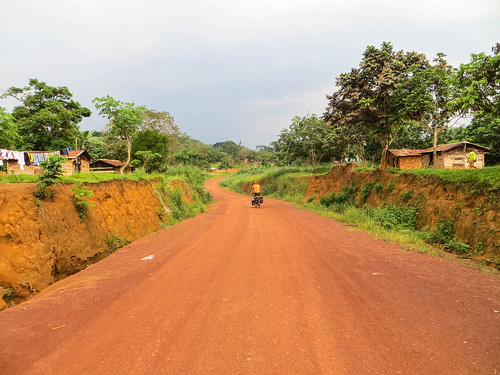
Most of the small shops also sell basic spares for motorbikes: Congo has motorbikes again! They completely disappeared in Gabon. Well, it’s not real Chinese motorbikes that can carry three people and two large bags of food, but Chinese jakartas, like a scooter.
A Malaysian driving a logging truck is passing in front of us. The shopkeeper complains that the Asian timber companies don’t care about giving jobs to the Congolese. Apparently, they only hire the locals who know where the good wood is. In the past, wood logging was the job of the French and the Germans. They used to have a plan to plant trees and exploit the forests sustainably. Nowadays, it is savage deforesting. “They take what they can and just leave“.
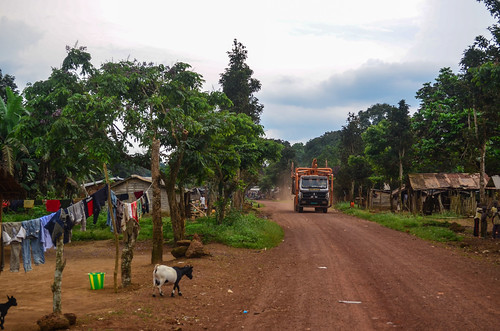
One of the funny questions that we have hard time answering is “in which season are we?” Cameroon messed up everything. In the north, there are two seasons, like everywhere in West Africa: the rainy season and the dry season. In the south, it was already different. In Gabon, we were told about the small rainy season and the small dry season, that separate the big rainy season and the big dry season. The problem is that we don’t get consistent answers when we ask about the season. So we are either in a rather dry small rainy season, or in the few rains of the small dry season.
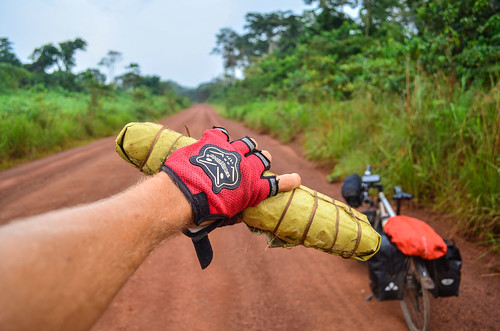
Well, that is for the theory. In practice, when we hear the thunder, no matter what the rather dry wet small big rainy dry season we are in, we should start to worry. The thunder has been rumbling for a good hour now. The MPD camp, where we could shelter, is five or ten kilometers away. Do we have time to cycle very fast to avoid the rain? Do we stop and change outfit to be prepared, risking to be hit by the rain just because we stopped? It’s a rainy season dilemma in the sparsely populated dirt roads, but as it could be pretty sudden and rather violent, we decide to change at the first raindrops: Cyril has a waterproof outfit, from head to toes. I don’t, so I dress surfer style: everything can get wet and I don’t care. I pack my pants and shoes in my waterproof panniers, and wear shorts and flip-flops. Finally, the raindrops do not even turn into the big rain.
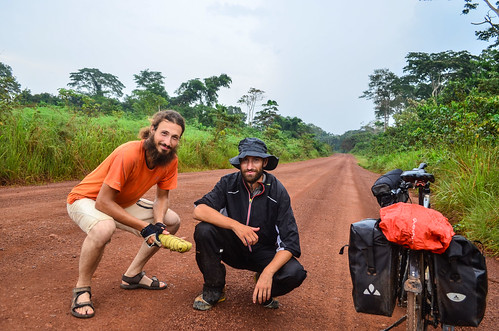
MPD stands for Mining Development Project, it is a subsidiary of Glencore Xstrata (world’s 12th biggest company according to Fortune 500, USD 214 billion for revenue, almost 200’000 employees). On the schools and bus stops, we can read sometimes “A subsidiary of Glencore“, sometimes “Sponsored by Xstrata“. They are not mining yet and only prospecting. They have a few machines and 20 Toyota Land Rovers at their base camp. The Whites (English and French, they say) are on holidays and the South African security company workers are not letting us in for filling up our water bottles, so I guess we won’t be able to sleep there tonight. MPD has been here for seven years and no ore has been extracted yet. Apparently, they quit the idea of building a train line from here, as the landscape is too hilly. Instead, they plan to make a straight road to Makabana, where an existing railway is still operating (that same one that used to carry the Gabonese manganese in the old times).

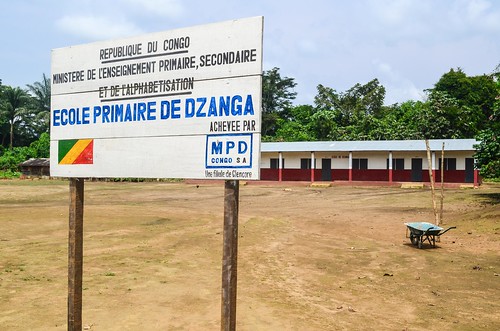
Five kilometers further, just when the mud of the dirt road starts to clog up my fenders, we reach Lefoutou, a small village with no brick house, but with a small hostel behind the bar. It is the simplest hostel possible, with a broken bed, between four walls made of wood planks, and with a view on the neighbors.
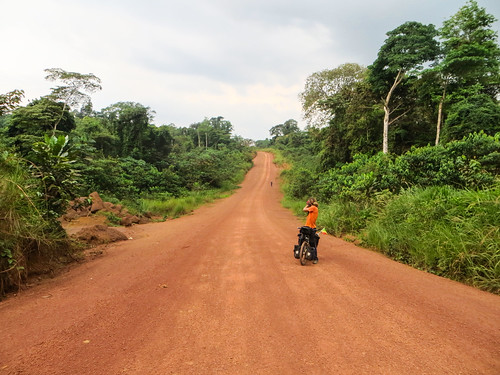
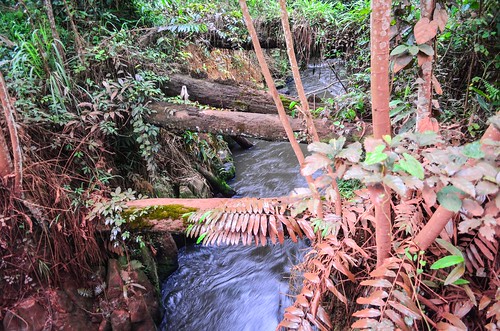
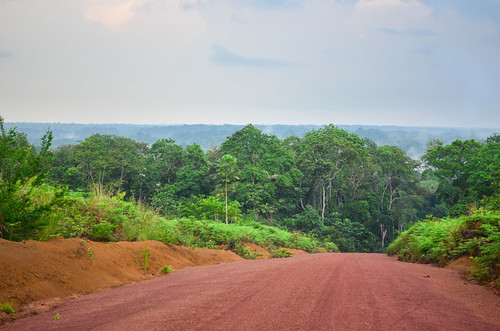
I don’t know what are the MPD people doing in the night, but a small boy, for sure below 15, comes to me and ask if I “need two little girls?” …
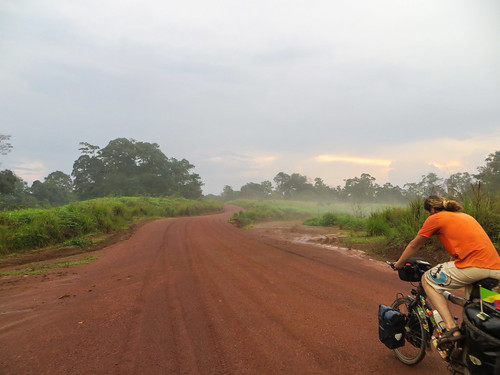
Everybody is saying that the road from Lefoutou to Komono is bad, with sections in the mud, and even impassable after the rain. It rained a lot yesterday but the night was clear, so we don’t know what to expect. The alternative is to head to Zanaga, via a 40 km dirt road, and then the tar road starts. But it also makes a detour.
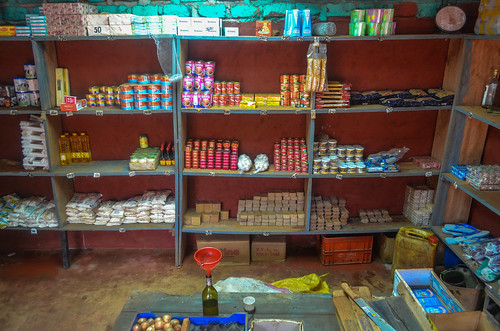
A usual, we get as much pro-Komono advice as pro-Zanaga advice. We finally pick the shortest road and luckily it looks good. The people on it say that there’s no problem for going until Komono. And since it must be a road with limited traffic, when the kids see us, some cry.
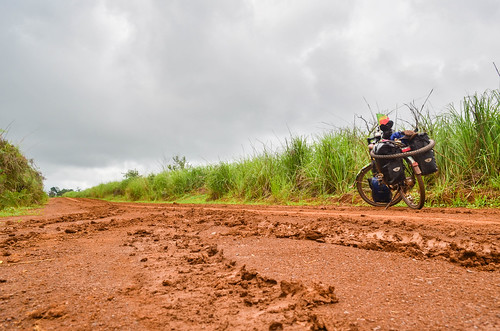
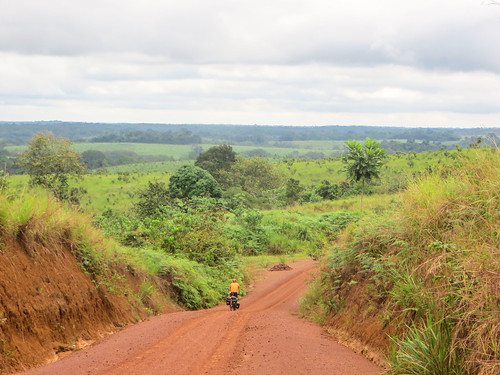
Denis Sassou N’Guesso is president of Congo since 1979, at the exception of a few years in the 90s when Pascal Lissouba came to power. Sassou is from the north, and not part of the major ethnic group in Congo. As a result, he barely had any chance of getting elected democratically. He received help from Angola (both countries were communist at this time) and from France (who needed a reliable local partner for the offshore operations; Lissouba had given oil concessions to an American company) to regain power, but this led to a civil war. The militias (called the Ninjas, the Cobras) of each potential president fought in Brazzaville, expelling the population to the forest. Today, the situation is, for a visitor, peaceful, and Sassou is enjoying his 30th year as president.

L’infatiguable batisseur means “the tireless builder”. It must be true, as I found here is a list of his (personal) achievements.
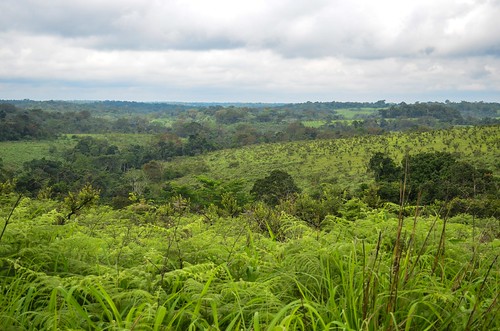
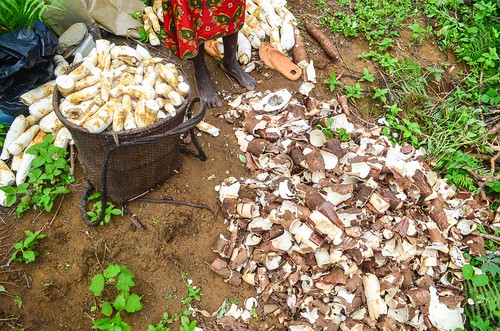
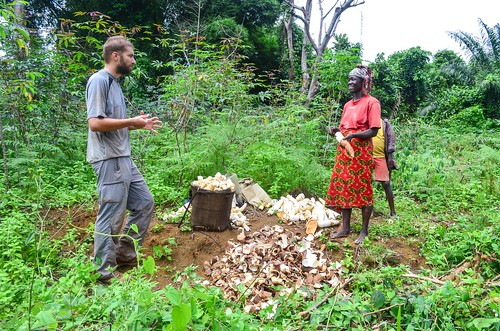
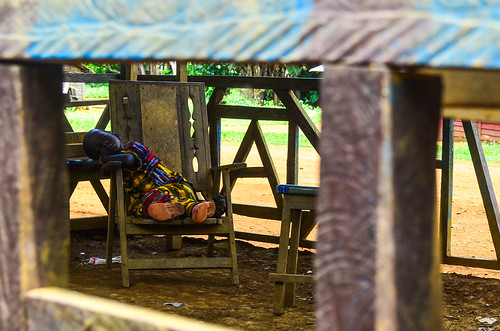
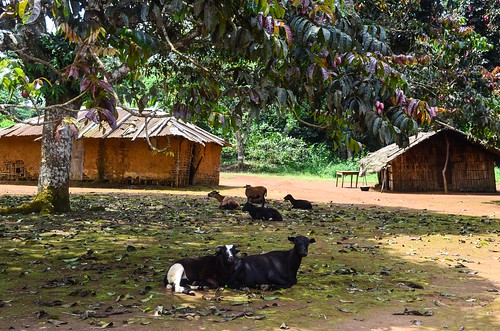
Without water points on the road, we have to follow the locals to the springs they use for drinking. Just before Kingani, in Douakani, we thus discover a very nice location.

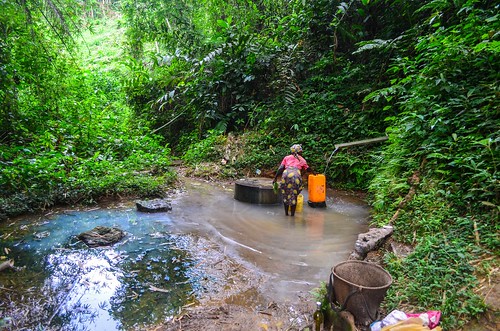

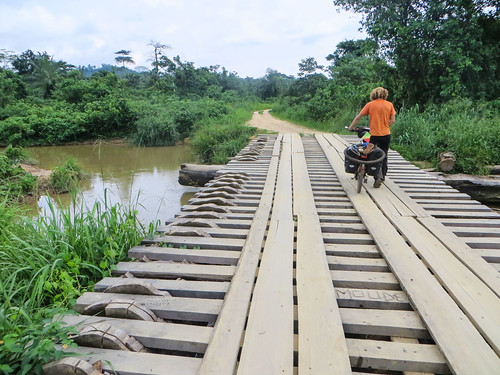
Another very nice discovery is bread! We have just eaten the baton de manioc for three meals in a row. Now, when I get full with it, it is not because I have eaten enough, but because my brain doesn’t let me eat more. If at least we had some sauce to eat it with …
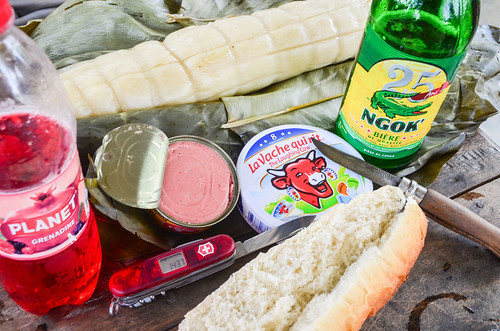
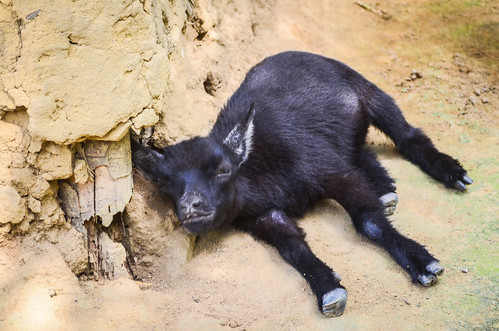
The policeman who comes to identify us in Kingani says that one of the Bambama murderers has been arrested close to the Gabonese border. By being on the straight road between Bambama and Sibiti, between the crime scene and the police station in charge of the case, we know everything that is happening. Policemen and gendarmes also know us.
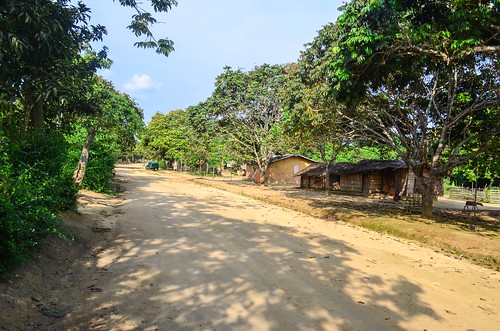
The dirt road is actually good. We don’t meet the sticky mud, and the “steep slopes” we were promised are gentle hills offering scenic views.
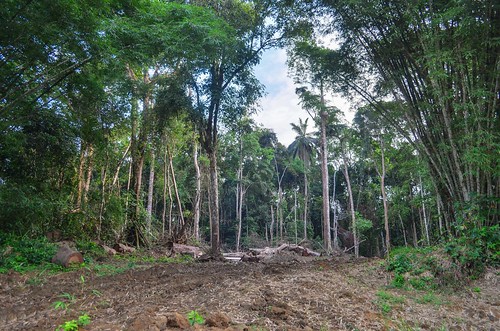
We don’t see many cars on the roads, just a few collective taxis from Sibiti. There are more old women coming from the fields and carrying a big basket of crops on their back, attached to a strap wrapped around their forehead. This looks very hard for women of that age, but as the men of Kingani told us, “this is the season for the women to work in the fields“. The men supposedly only work in the dry season when they need to clear the fields.
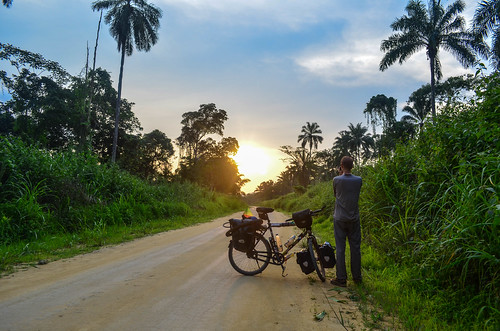
We also meet one large truck, whose driver works for the Indonesians. The Malaysians had the area close to the Gabonese border. He says that he is moving mobile houses from an old camp of French forestiers to put them in the camp of Indonesians. As he knows the road, we ask him what does the “DLS 310” sign mean. It must mean 310 KM to Dolisie, but why is it increasing when we should get closer? The driver answers that the logging trucks use another road, making a detour near Zanaga and then back to Dolisie. But actually, according to his experience, the value is underestimated and it is closer to 400 km. Drivers are paid on a kilometer basis and it allows the employers save on salaries.

A very nice road of white sand leads us to Makaga, where the chief Madzou welcomes us for the night. We sleep indoors after a bucket shower under the stars, and a tasting of the atanga fruit, called here safou, which tastes for me in between a plum and an avocado.
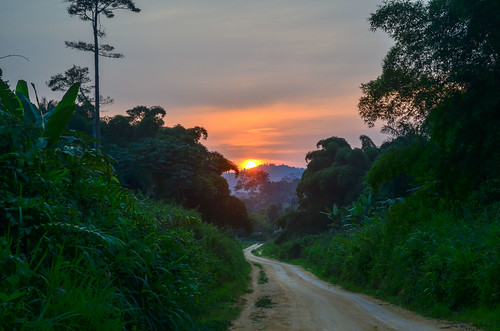







Leave a Reply